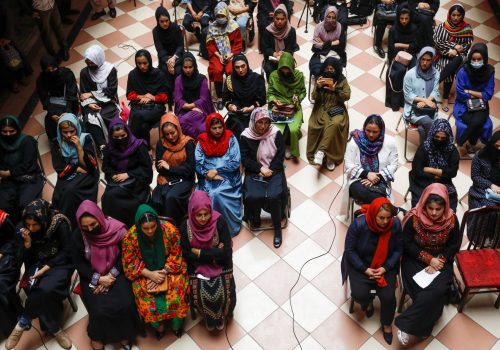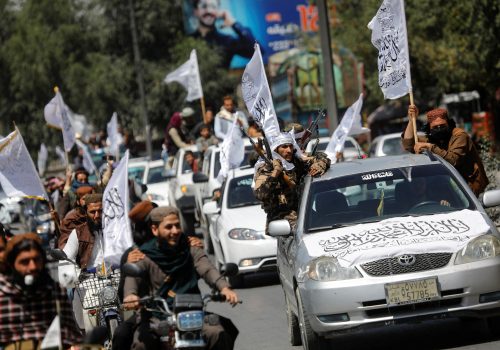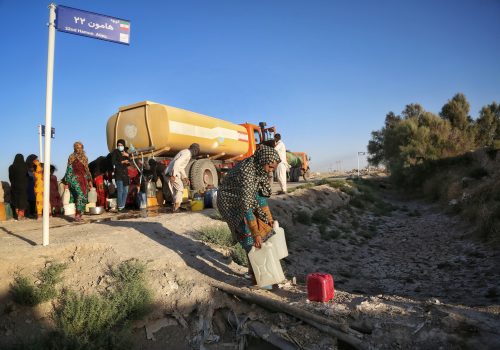Afghanistan’s next generation must rise above the Taliban’s ‘reality’
This month marks the second anniversary of the withdrawal of US forces from Afghanistan and the Taliban’s military takeover of the country. The devastating images of Kabul in mid-August 2021 depicting despair, chaos, and abandonment are still vivid in our memories. These images also symbolized the collapse of democracy in Afghanistan. Despite evident shortcomings, this democratic state, for which I served as deputy foreign minister from 2015 to 2019, unleashed an unprecedented era of socioeconomic progress in Afghanistan’s history.
For the majority of Afghanistan’s new generation—those who worked, fought, and aspired for a free, democratic, and prosperous country—it has been a harrowing two years. It has been two long years of processing grief and overcoming the anguish of abandonment and collapse, but also two years of engaging in self-reflection, reorganization, and resistance.
The country is in a deep crisis; the status quo is not sustainable. The challenges ahead are enormous and multidimensional, but all is not lost. Afghanistan’s most precious asset, developed over the past two decades, is its professional and well-connected youth. More than 60 percent of Afghanistan’s population is under the age of twenty-five. The burden of resolving this crisis by spotting and exploiting opportunities amid this calamity falls on this generation. They are slowly but surely rising to the task.
The Taliban reneged on the promises they made during the Doha negotiation process to form an inclusive government and provide women and girls with access to education.
The challenges ahead are indeed colossal. Afghanistan faces a deeply divided society, a demoralized elite, a broken economy, an exhausted civil society, and an extremist ethnoreligious group in control of the country. The Taliban reneged on the promises they made during the Doha negotiation process to form an inclusive government and provide women and girls with access to education. Instating exclusively male and essentially Pashtun mullahs, they failed to gain domestic and international legitimacy. They continue to impose draconian and regressive laws, which are pushing the country into a downward spiral in every socioeconomic, human-rights, and fundamental-freedoms index. After systematically erasing women and girls from public life, the Taliban administration is on the brink of being designated as a gender apartheid regime by United Nations–appointed rights experts. Its symbiotic relations with foreign terrorist groups, drug production and trafficking, and systematic promotion of violent extremist ideology pose imminent threats to the immediate region and beyond.
The international community, weary and incoherent in its approach to the crises, has retreated to the background, only to engage in narrow humanitarian diplomacy. With each new edict from the Taliban’s reclusive leader, the bar on the protection of human rights and fundamental freedoms lowers further. International demands for an inclusive and representative government are confined to written reports. International leaders have dropped democratization from their talking points on the Taliban regime altogether.
Yet members of Afghanistan’s new generation—inside the country and in exile—have not given up, neither on their country nor on their hope and aspiration for the creation of a free, rights-based, and prosperous state that can serve as a home to all its citizens. Only two days after the Taliban’s military takeover, women and girls took to the streets of Kabul and other major cities to demand their fundamental rights. The call by women for “food, work, and freedom” ignited the first sparks of a civil resistance movement in the cities. Similarly, despite the chaotic disintegration of Afghanistan’s national security forces, some soldiers and officers have laid the foundations of a national resistance front in the rural mountains of Afghanistan. Afghan diaspora communities have organized protests and launched advocacy campaigns for the restoration of rights and dignity around the world.
Afghans’ struggle for a better Afghanistan entails standing against the brutality of a formidable foe but also enduring the selective amnesia of retreating friends.
The most excruciating challenge of all is the spread of a self-deprecating narrative among certain circles outside Afghanistan that there is no alternative to the Taliban government and that it is the “reality” that Afghans have to live with. This narrative is wrong and lazy. The Taliban are not and never were an acceptable alternative to a democratic state in a pluralistic society such as Afghanistan. While they are a part of the country’s “reality,” this does not mean that the people of Afghanistan shouldn’t rise above and aspire for better. Hence Afghans’ struggle for a better Afghanistan entails standing against the brutality of a formidable foe but also enduring the selective amnesia of retreating friends.
More serious than often-cited tribal or regional rifts—Durrani versus Ghilzai or east versus south—are the inherent internal contradictions in the Taliban attitude toward contemporary governance, education, economics, and foreign affairs. The concept of equality of treatment and opportunities for citizens and long-term peaceful coexistence with the outside world, the two prerequisites of enduring stability in Afghanistan, are not ingrained in the movement’s DNA. Their dogmatic, anti-Enlightenment, and misogynist ideas and practices are not only a nuisance for the developed world, but also a threat to the new wave of modernization in Muslim-majority nations.
History has shown that dogmatic regimes defy the normative principle of diplomatic engagement. Concessions don’t lead to counter-concessions but to the strengthening of power. The Taliban’s behavior during the peace talks and after their assumption of power vindicates this argument. They are running in the opposite direction of the caravan of human progress. International engagement should prioritize containment and damage control rather than offering more concessions.
The international community’s nonrecognition of the Taliban regime has created an enabling environment for Afghanistan’s civil and political forces to coalesce around common values and principles and demand the restoration of human rights, fundamental freedoms, and an inclusive and representative government. International civil society, parliamentarians, academic institutions, women’s rights groups, associations of veterans, and friends of Afghanistan are actively supporting these endeavors. Taking note of the Taliban’s intransigence and regressive policies, their failure to gain international legitimacy, and the emergence of a civil resistance movement, many Afghans inside the country have not settled with the Taliban and do not perceive them as a legitimate and permanent government.
A realistic assessment of the above challenges points to opportunities to positively engage all relevant stakeholders. Afghanistan’s professional and emerging political forces, journalists, and academics are rapidly establishing themselves as units of a mass resistance and reform movement. It is these Afghans, particularly among the youth, who must unite to save the country.
Nasir Andisha is the ambassador and permanent representative of Afghanistan to the United Nations in Geneva. He is a former vice president of the Human Rights Council (2020) and deputy foreign minister of Afghanistan (2015-2019).
Further reading
Thu, Jun 29, 2023
How to advance women’s rights in Afghanistan
Issue Brief By Roya Rahmani
Providing Afghan women with rights and opportunities must be at the top of the regional and global security agenda.
Tue, May 23, 2023
A conversation with Hassan Abbas on his new book “The Return of the Taliban”
Interview By
Uzair Younus talks to Hassan Abbas, distinguished professor at National Defense University, about his new book "The Return of the Taliban."
Fri, Jul 7, 2023
Iran and Afghanistan are feuding over the Helmand River. The water wars have no end in sight.
IranSource By Holly Dagres
Fatemeh Aman, a non-resident senior fellow at MEI, on why the Islamic Republic and Taliban are bumping heads on transboundary water issues.
Image: Afghan women, who have seen their rights diminish day by day, demonstrate in the center of Kabul, Afghanistan, Saturday August 13, 2022. Oriane Zerah/ABACAPRESS.COM


